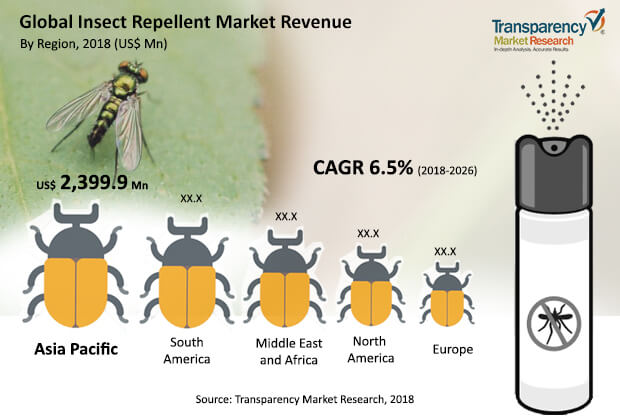Insect Repellent Market: Pin-Point Analyses Of Market Competition Dynamics To Offer You A Competitive Edge

According to a new market report published by Transparency Market Research titled “Insect Repellent Market – Global Industry Analysis, Size, Share, Growth, Trends, and Forecast, 2018 – 2026,” the global insect repellent market is expected to reach US$ 7 Bn by 2026, expanding at a CAGR of 6.5% from 2018 to 2026. Asia Pacific held the dominant share of the insect repellent market in 2017.
Insect repellent are the substances which deter insects from approaching a particular room or area. The insect repellent can be in the form of solid, liquid, or gas. Consumers prefer these forms based on their convenience and requirements. Insect repellent products are available in coils, liquid vaporizers, sprays/aerosols, cream & oil and other forms.
Health consciousness is increasing amongst the urban population across the globe as awareness regarding safety against insects is increasing. Furthermore, the increasing literacy rate in developing countries is aiding the rural population to focus more on health & cleanliness. People are taking more precaution about their health and are becoming aware about the use of protective aids to prevent insect bites that may cause harm to the body especially during outdoor recreational activities.
Planning To Lay Down Future Strategy? Request Sample https://www.transparencymarketresearch.com/sample/sample.php?flag=S&rep_id=42818
The use of synthetic and natural insect repellents advertised in various pharmaceutical forms is rising due to the increasing occurrence of vector-borne viral diseases such as Zika, dengue, chikungunya, malaria, and yellow fever. There has been a change in consumer demographics shifting toward use of natural insect repellent products such as essential oils that have low toxicity and do not harm the environment rather than DEET based products that may cause health issues due to toxic chemicals.
Factors such as high levels of urbanization, favorable climate, and lack of awareness about basic sanitation plays a major role in insect breeding, providing potential opportunity for the insect repellent manufacturers.
In line with the same, manufacturers are focusing on developing innovative insect repellent products by using natural ingredients in order to have an extensive, established product portfolio to target different consumers
Increasing bed bug population has fueled the demand for insect repellents in the U.S.. Bed bugs cause irritating and painful bites. These insects are extremely small and very difficult to get rid of as they can live for months without feeding. The concentration of chemicals in these insect repellents are expected to increase as bed bugs seem to be resistant to almost all the insecticides available in the industry. The people in the U.S. are fond of camping and other outdoor activities. Cream & oil segment is also expected to have potential growth prospects as the population in the region usually prefer to apply cream and oil while going for camping and other recreational activities.
Request To Access Market Data Insect Repellent Market
Growing global warming and growing incidence of mosquito borne diseases is expected to drive the demand for insect repellents in the Asia Pacific region. Moreover, growing awareness amongst health officials and governments about mosquito controlling is a major factor supporting industry growth in this region. China accounted for the largest value share in 2016 amongst other countries in Asia Pacific. Both local and established manufacturers are present, catering to the requirement of the region, thereby targeting different population segments. India is expected to have the highest CAGR of 7.5% from 2018 to 2026. Presence of numerous manufacturers focusing on R&D in product innovation will cater to the changing demand of consumers over the forecast timeline.
Humid weather and dense housing areas in China are potential vulnerable sources for insect breeding, thereby driving the growth of the insect repellent market over the forecast period. Cockroaches, ants, and mosquitoes are majorly found in the households as compared to other insects. Manufacturers and consumers are also showing growing interest in child-specific products. The two-child policy and growing number of home care products targeting children and babies in the country has increased health and hygiene awareness.
Manufacturers are focusing on producing innovative insect repellent products by using natural ingredients in order to have an extensive product portfolio to target different consumers. The emerging players of the insect repellent market are Quantum Health, Enesis Group, and ExOfficio LLC. The prominent players of the industry are Dabur International, Jyothi Laboratories, Coghlan’s Ltd., and Godrej Consumer Products Ltd.
Comments
Post a Comment